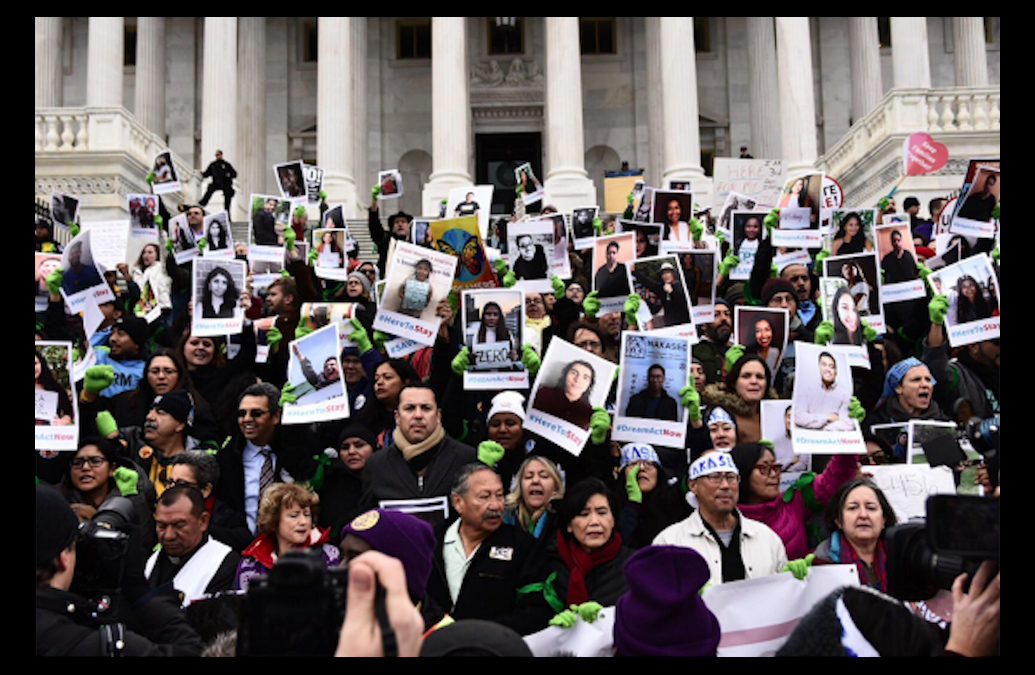Accountability and Transparency: Linda Medina ‘18 Reflects on Brown in Washington Program

In an effort to share student experiences in Washington with students on campus, Fall 2017 Brown in Washington fellows were asked to take a photo and write a caption that helps describe a memorable part of their learning experience while working with the D.C. community during their semester away.
Linda Medina ‘18, a Public Policy & Ethnic Studies concentrator, reflected on her semester interning at the Center for Community Change.
"While I was studying abroad last semester, my community back home was being terrorized by the Trump administration's attack on immigrant and refugee communities. Although I was learning about the power of community organizing and strategies to defend human rights in a global context, I felt powerless to what was happening back home and the fact that I was not able to be present for my family was even more troubling.
At the same time the Muslim ban was announced in the U.S., in class I was reading Iris Young’s “Five Faces of Oppression,” where she identifies powerlessness as one of the five faces of oppression. Young states, “In the United as in other advanced capitalist countries, most workplaces are not organized democratically, direct participation in public policy decisions is rare, and policy implementation is, for the most part, hierarchical, imposing rules on bureaucrats and citizens.” And in the wake of powerlessness a culture of silence prevails as those with marginalized identities stop resisting or succumb to a state of oppression. As I learned from womxn of color in Nepal, Jordan and Chile the importance of contesting this state of powerlessness by amplifying counter-narratives, I saw the importance of fighting back against the prevailing rhetoric that criminalizes and racializes immigrants. Specifically, I wanted to learn from community organizers working alongside immigrant communities how to build our communities' political power to catalyze systemic change. That is why I decided to intern at the Center for Community Change (CCC), to learn how to amplify the voices of low-income people of color and to build our political power.
Since I have been interning at the Center for Community Change, Deferred Action for Childhood Arrivals has been repealed, certain communities have lost their temporary protected status, womxn's reproductive health has been under attack, the Affordable Care Act has been weakened and monumental tax cuts are currently underway. Although it feels as if these series of human rights violations are never-ending, members of the CCC continuously look for ways to hold the administration accountable and never lose sight in the need to empower communities to gain control over the public policies affecting them at a local level. Throughout my internship, I realized how the CCC differs from think tanks and other nonprofits as they simultaneously work on releasing educational resources covering pressing racial economic justice issues and applying political pressure on policymakers.
The CCC prioritizes establishing long-term, trustworthy relationships with an expansive network of grass roots organizations, which enables them to expand their influence across multiple states. In the case of the CCC’s campaign on affordable and accessible childcare, local activists and community members succeeded at influencing Senator Murray’s action in introducing the Childcare for Workers Families act, to alleviate the financial burden of childcare for low to moderate-income households. On the other hand, I know that many marginalized communities have a history of trauma in their interactions with the nonprofit industrial complex. Some community members are distrustful from previous relations with nonprofits that were mostly transactional and exploitative. My work at CCC helped me look at different mechanisms of accountability and transparency for different actors in the policy realm."
